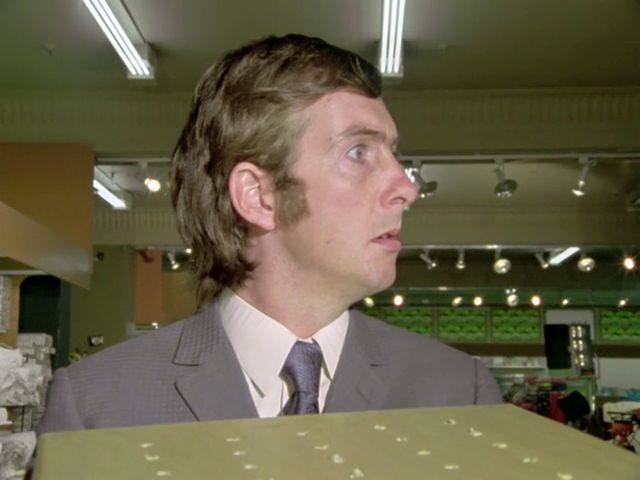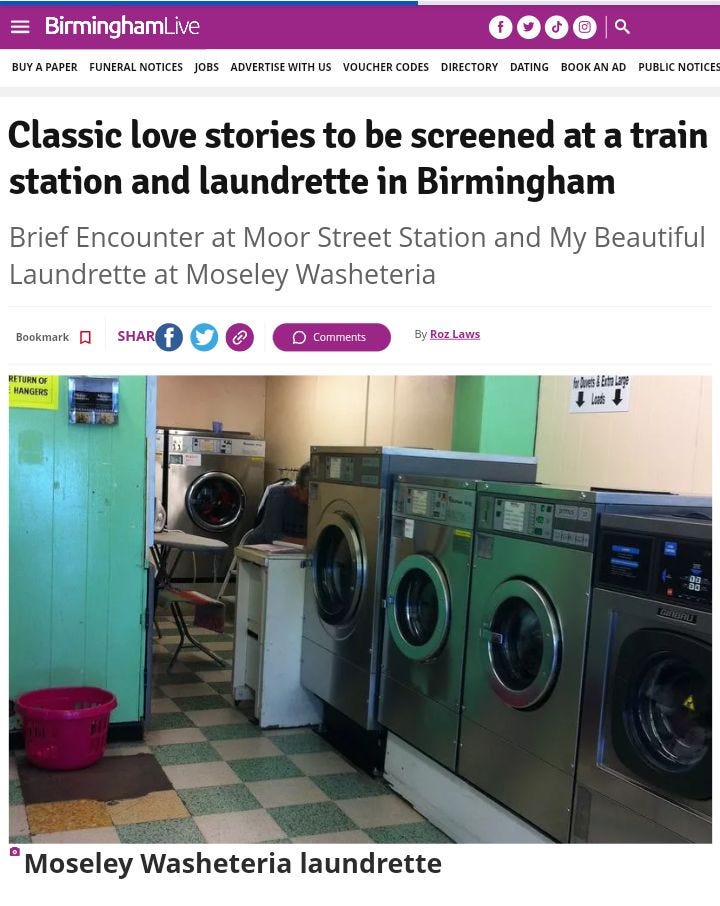Monty Python: Michael Ellis
This is by way of another experimental post, because I am trying to overcome the inability I have always experienced to blog about Monty Python's Flying Circus. I can happily watch this show over and over again, roaring with laughter each time, but when I have tried to blog about it, I invariably find I have nothing to say. I am therefore wondering whether this is because Monty Python doesn't work with my usual format of one blog post per episode of a show and am going to let the show overflow the usual format and blog about a few things in addition to Michael Ellis. My excuse for this is that of course the idea of a blog originated as a 'weblog' so I'm going to log Monty Python's effect on me and just log what comes into my head, so this post will be even more chaotic than usual, I'm afraid, but you can blame the penguin on top of the telly for that.
In reality, I find that the way Monty Python affects me is that a particular sketch or episode will enter my consciousness for a matter of months and flatly refuse to leave, until it is replaced by another one.
For a long time the Monty Python sketch which was inhabiting my head was Mrs Premise and Mrs Conclusion Visit Jean-Paul Sartre, from the third series episode, Whicker's World. There is absolutely no reason that these two pepperpots should be introduced in the middle of Njorl's Saga and the repentant mass murderer, just as I'm not sure there is any reason Monty Python should refer to the female characters they playin drag, as pepperpots. But I love the way it starts off with a philosophical discussion in a laundrette.
Completely off-topic, I have to say that the laundrette in Birmingham most likely to chance to have a Paris phone directory would be the Selly Soak (in Selly Oak), which as well as laundering also allows you to transfer money, which tickles me no end. This is of course because it is closest to the university, and I'm only sorry that I couldn't choose the laundrette in Moseley for this honour because there was once a showing of My Beautiful Laundrette *actually in the laundrette*, which if you don't know Birmingham tells you everything you could ever want to know about Moseley.
I love Mrs Sartre, I love the life of a philosopher, I love that the two ladies just drop everything to go and ask Jean-Paul their question, and I love the way Mrs Premise met him on holiday in France. There is something completely perfect about this sequence, it's perfectly paced, just realistic and ridiculous enough, and it took a long time for it to leave my head.
Then for a long time Ethel the Frog (from the series 2 episode Face the Press) entered my head and wouldn't leave. I love the way it's in the form of a mock documentary which is absolutely insane.
Doug and Dinsdale Piranha are, of course, completely inapproproately based on famous vicious gangsters Reggie and Ronnie Kray, who did a lot worse than nail people's heads to coffee tables. The comparison is made complete by Dinsdale's interest in boys' clubs, sailors' homes, choristers' associations, scouting jamborees, and the household cavalry, which perfectly mirror Ronnie's interests. Also Inspector Harry 'Snapper' Organs mirrors the officer who brought down the Krays, Detective Superintendent Leonard 'Nipper' Read.
When I say that Ethel the Frog parodies a documentary I mean this quite literally, and of course there are lots of documentaries about the Krays reflecting our national interest in them. However perhaps the best example of the sort of documentary which Ethel the Frog parodies is the 1977 The Ruth Ellis Story, about the last woman to be hanged in Britain. It is exactly the sort of cast of larger than life characters and eccentrics that the Pythons parody in their spoof documentaries, and reflects the same hopelessness and inefficiency of our national life in actually getting anything done or sorted. The Ruth Ellis Story periodically appears online before being taken down again, but I'm not aware of any commercial release at the moment. However honestly it's just like a Monty Python documentary, just that the subject is real and deadly serious.
The same eccentricity at the centre of our national life is also reflected in the current Monty Python episode to settle into my head and refuse to leave, the final series episode Michael Ellis.
I think the reason it has taken hold of me is that it has taken a perfectly normal setting - a department store - and filled it with the sort of eccentrics that couldn't possibly be real but are perilously close to characters we know. The collecting animals and TV sets appear relatively normal in comparison to some of the things in the store, and I think what I like best is that some scenes (such as the scene where the man who isn't Michael Ellis hears Michael Ellis being called on the PA), were clearly recorded in a real department store, which I haven't been able to identify.
A department store is a wonderful setting for Monty Python because it is an institution anyway, so the outsider feels out of sorts and isn't necessarily acquainted with all the rituals of the insiders. It also particularly has a high level of artifice: the furniture is arranged in rooms which aren't real, and the clothes are displayed on models which aren't real. Like all retail settings a department store sells dreams which actually aren't ours yet.
Haven't we all wondered whether you could actually buy a flame thrower from a department store? After a suitable test in the shop which would involve setting your fellow shoppers and the complaints department on fire, of course. Harrods in Knightsbridge of course has always been said to sell literally anything so you probably could get one there. The show further draws on reality in the act of buying a pet ant - only a few years ago a British Pathe film had shown a London secretary walking her pet leopard on a lead round the streets, so the Pythons have only really gone one step on.
And we all know someone with a passion for collecting technology, even if it does mean heaping up the television sets in the living room while you're giving drugs to the tiger. My own father used to collect and restore antique grandfather clocks, and at one point we had four of them in a row on the landing, all working. He would stop them chiming at night of course, but during the say they would often chime different times because they weren't very well. We were used to it but guests could get rather freaked out by the clocks randomly striking 13 when they felt like it.
Michael Ellis is another example where it's close enough to reality that it could actually happen. The show inserts us further into its own reality in the Victorian poetry reading scene by having the audience in mixed Victorian and contemporary clothing: possibly not as valid 50 years later but it's like we are the characters dressed in sta-prest and bri-nylon next to the Victorian characters.
It's also unusual for being one of the only (I think) two episodes of Monty Python that carry one setting or story arc across the whole episode. This provides quite a different atmosphere, more like a film, than most of the other episodes. The show once again derails this continued narrative by having the end titles at the beginning and by considering several different endings before the actual abrupt ending.
Even though it has actually ended, Michael Ellis nonetheless managed to live on in my head. I'm also impressed with the utter bizarreness of the blog post it's managed to produce.
But then that's life in the UK. You didn't think Monty Python was a comedy did you? It's a documentary.
This blog is mirrored at
culttvblog.tumblr.com/archive (from September 2023) and culttvblog.substack.com (from January 2023 and where you can subscribe by email)
Archives from 2013 to September 2023 may be found at culttvblog.blogspot.com and there is an index to the tags used on the Tumblr version at https://www.tumblr.com/culttvblog/729194158177370112/this-blog




